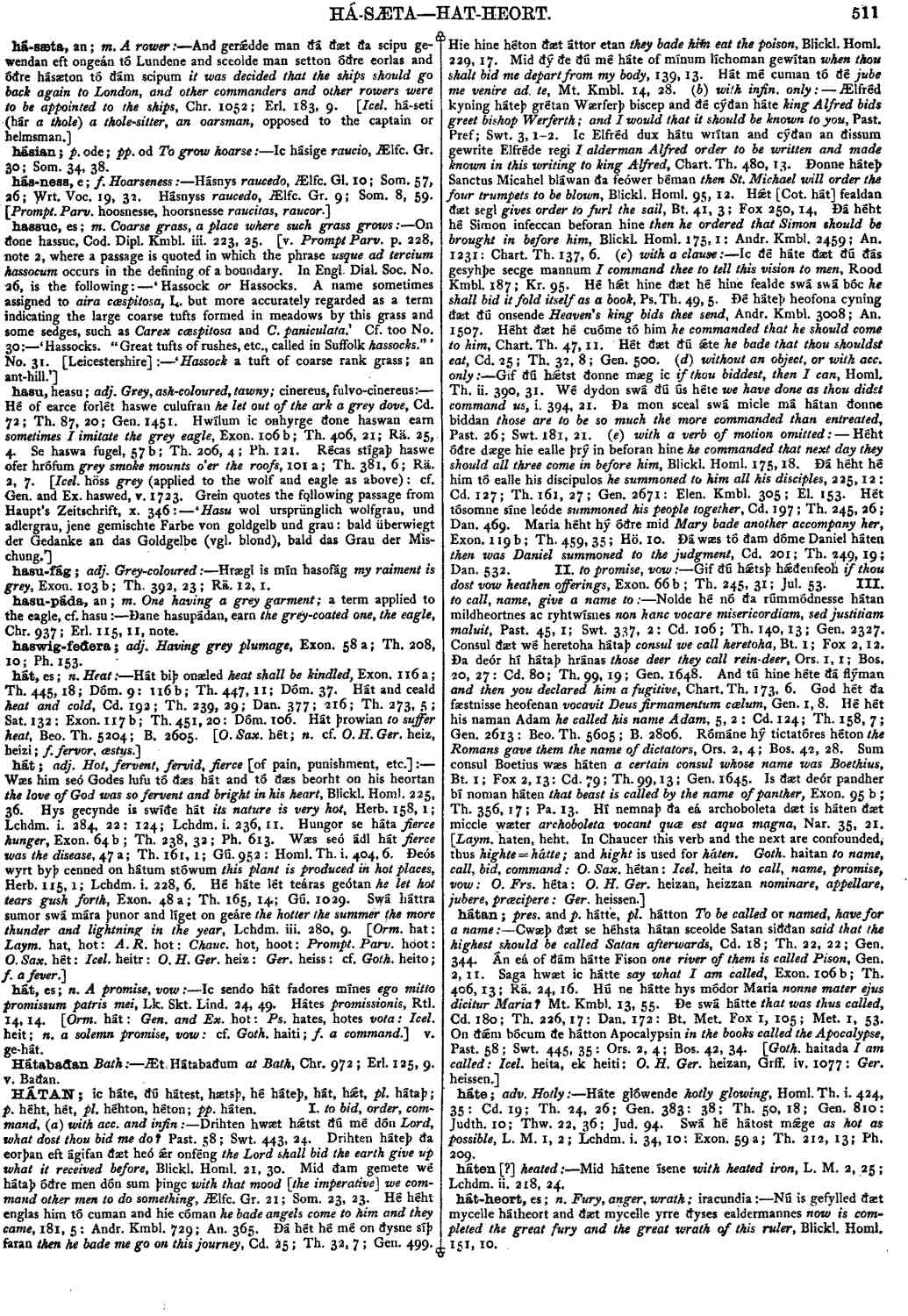HÁTAN
- verb [ strong ]
-
Drihten hwæt hǽtst ðú mé dón
Lord, what dost thou bid me do?
- Past. 58; Swt. 443, 24.
-
Drihten háteþ ða eorþan eft ágifan ðæt heó ǽr onféng
the Lord shall bid the earth give up what it received before,
- Blickl. Homl. 21, 30.
-
Mid ðam gemete wé hátaþ óðre men dón sum þingc
with that mood [the imperative] we command other men to do something,
- Ælfc. Gr. 21; Som. 23, 23.
-
Hé héht englas him tó cuman and hie cóman
he bade angels come to him and they came,
- 181, 5: Andr. Kmbl. 729; An. 365.
-
Ðá hét hé mé on ðysne síþ faran
then he bade me go on this journey,
- Cd. 25; Th. 32, 7; Gen. 499.
-
Hie hine héton ðæt áttor etan
they bade him eat the poison,
- Blickl. Homl. 229, 17.
-
Mid ðý ðe ðú mé háte of mínum líchoman gewítan
when thou shalt bid me depart from my body,
- 139, 13.
-
Hát mé cuman tó ðé jube me venire ad te, Mt. Kmbl. 14, 28. (b) with infin. only :-- Ælfréd kyning háteþ grétan Wærferþ biscep and ðé cýðan háte
king Alfred bids greet bishop Werferth; and I would that it should be known to you,
- Past. Pref; Swt. 3, 1-2.
-
Ic Elfréd dux hátu wrítan and cýðan an ðissum gewrite Elfréde regi
I alderman Alfred order to be written and made known in this writing to king Alfred,
- Chart. Th. 480, 13.
-
Ðonne háteþ Sanctus Micahel bláwan ða feówer béman
then St. Michael will order the four trumpets to be blown,
- Blickl. Homl. 95, 12.
-
Hǽt [Cot. hát] fealdan ðæt segl
gives order to furl the sail,
- Bt. 41, 3; Fox 250, 14.
-
Ðá héht hé Simon infeccan beforan hine then he ordered that Simon should be brought in before him, Blickl. Homl. 175, 1: Andr. Kmbl. 2459; An. 1231: Chart. Th. 137, 6. (c) with a clause :-- Ic ðé háte ðæt ðú ðás gesyhþe secge mannum
I command thee to tell this vision to men,
Rood- Kmbl. 187; Kr.
95.
-
Hé hǽt hine ðæt hé hine fealde swá swá bóc
he shall bid it fold itself as a book,
- Ps. Th. 49, 5.
-
Ðé háteþ heofona cyning ðæt ðú onsende
Heaven's king bids thee send,
- Andr. Kmbl. 3008; An. 1507.
-
Héht ðæt hé cuóme tó him
he commanded that he should come to him,
- Chart. Th. 47, 11.
-
Hét ðæt ðú ǽte he bade that thou shouldst eat, Cd. 25; Th. 32, 8; Gen. 500. (d) without an object, or with acc. only :-- Gif ðú hǽtst ðonne mæg ic
if thou biddest, then I can,
- Homl. Th. ii. 390, 31.
-
Wé dydon swá ðú ús héte
we have done as thou didst command us,
i.- 394, 21.
-
Ða mon sceal swá micle má hátan ðonne biddan those are to be so much the more commanded than entreated, Past. 26; Swt. 181, 21. (e) with a verb of motion omitted :-- Héht óðre dæge hie ealle þrý in beforan hine
he commanded that next day they should all three come in before him,
- Blickl. Homl. 175, 18.
-
Ðá héht hé him tó ealle his discipulos
he summoned to him all his disciples,
- 225, 12: Cd. 127; Th. 161, 27; Gen. 2671: Elen. Kmbl. 305;
El. 153.
-
Hét tósomne síne leóde
summoned his people together,
- Cd. 197; Th. 245, 26; Dan. 469.
-
Maria héht hý óðre mid
Mary bade another accompany her,
- Exon. 119 b; Th. 459, 35; Hö. 10.
-
Ðá wæs tó ðam dóme Daniel háten
then was Daniel summoned to the judgment,
- Cd. 201; Th. 249,19; Dan. 532.
-
Gif ðú hǽtsþ hǽðenfeoh
if thou dost vow heathen offerings,
- Exon. 66 b; Th. 245, 31; Jul. 53.
-
Nolde hé nó ða rúmmódnesse hátan mildheortnes ac ryhtwísnes
non hanc vocare misericordiam, sed justitiam maluit,
- Past. 45, 1; Swt. 337, 2: Cd. 106; Th. 140, 13; Gen.
2327.
-
Consul ðæt wé heretoha hátaþ
consul we call heretoha,
- Bt. 1; Fox 2, 12.
-
Ða deór hí hátaþ hránas
those deer they call rein-deer,
- Ors. 1, 1; Bos. 20, 27: Cd. 80; Th. 99, 19; Gen.
1648.
-
And tú hine héte ðá flýman
and then you declared him a fugitive,
- Chart. Th. 173, 6.
-
God hét ða fæstnisse heofenan
vocavit Deus firmamentum cælum,
- Gen. 1, 8.
-
Hé hét his naman Adam
he called his name Adam,
- 5, 2: Cd. 124; Th. 158, 7; Gen. 2613: Beo. Th. 5605; B.
2806.
-
Rómáne hý tictatóres héton
the Romans gave them the name of dictators,
- Ors. 2, 4; Bos. 42, 28.
-
Sum consul Boetius wæs háten
a certain consul whose name was Boethius,
- Bt. 1; Fox 2, 13: Cd. 79; Th. 99, 13; Gen. 1645.
-
Is ðæt deór pandher bí noncan háten
that beast is called by the name of panther,
- Exon. 95 b; Th. 356, 17; Pa. 13.
-
Hí nemnaþ ða eá archoboleta dæt is háten ðæt miccle wæter
archoboleta vocant quæ est aqua magna,
- Nar. 35, 21,
Bosworth, Joseph. “HÁTAN.” In An Anglo-Saxon Dictionary Online, edited by Thomas Northcote Toller, Christ Sean, and Ondřej Tichy. Prague: Faculty of Arts, Charles University, 2014. https://bosworthtoller.com/18213.
Checked: 0